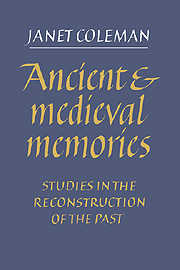Book contents
- Frontmatter
- Contents
- Preface
- List of abbreviations
- PART I THE CRITICAL TEXTS OF ANTIQUITY
- Introduction
- 1 Plato
- 2 Aristotle
- 3 Cicero
- 4 Pliny and Roman naturalists on memory; Borges's Funes the Memorious
- 5 Plotinus and the early neo-Platonists on memory and mind
- 6 Augustine: the early works
- 7 Augustine's De Trinitate; on memory, time and the presentness of the past
- PART II THE PRACTICE OF MEMORY DURING THE PERIOD OF TRANSITION FROM CLASSICAL ANTIQUITY TO THE CHRISTIAN MONASTIC CENTURIES
- Introduction
- PART III THE BEGINNINGS OF THE SCHOLASTIC UNDERSTANDING OF MEMORY
- Introduction
- PART IV ARISTOTLE NEO-PLATONISED: THE REVIVAL OF ARISTOTLE AND THE DEVELOPMENT OF SCHOLASTIC THEORIES OF MEMORY
- Introduction
- PART V LATER MEDIEVAL THEORIES OF MEMORY: THE VIA ANTIQUA AND THE VIA MODERNA.
- Introduction
- Conclusion: an all too brief account of modern theories of mind and remembering
- Bibliography
- Index
5 - Plotinus and the early neo-Platonists on memory and mind
Published online by Cambridge University Press: 06 January 2010
- Frontmatter
- Contents
- Preface
- List of abbreviations
- PART I THE CRITICAL TEXTS OF ANTIQUITY
- Introduction
- 1 Plato
- 2 Aristotle
- 3 Cicero
- 4 Pliny and Roman naturalists on memory; Borges's Funes the Memorious
- 5 Plotinus and the early neo-Platonists on memory and mind
- 6 Augustine: the early works
- 7 Augustine's De Trinitate; on memory, time and the presentness of the past
- PART II THE PRACTICE OF MEMORY DURING THE PERIOD OF TRANSITION FROM CLASSICAL ANTIQUITY TO THE CHRISTIAN MONASTIC CENTURIES
- Introduction
- PART III THE BEGINNINGS OF THE SCHOLASTIC UNDERSTANDING OF MEMORY
- Introduction
- PART IV ARISTOTLE NEO-PLATONISED: THE REVIVAL OF ARISTOTLE AND THE DEVELOPMENT OF SCHOLASTIC THEORIES OF MEMORY
- Introduction
- PART V LATER MEDIEVAL THEORIES OF MEMORY: THE VIA ANTIQUA AND THE VIA MODERNA.
- Introduction
- Conclusion: an all too brief account of modern theories of mind and remembering
- Bibliography
- Index
Summary
In a book on ancient and medieval memories, why should we spend time on Plotinus? Firstly, it must be said that his Enneads would greatly influence the thought of St Augustine, that most important of Church Fathers whose views on virtually everything would dominate the medieval, Renaissance and Reformation worlds. But Plotinus also greatly influenced the mystical, neo-Platonist tradition of the high middle ages as we shall see. His thought was revived amongst certain twelfth-century thinkers who would propound one of the most powerful psychological theories concerning memory in relation to knowledge, a theory that would profoundly influence the practical ways certain men not only thought about but also lived their lives. Plotinus is a difficult thinker. But for us he represents a distinct and influential manner of discussing the relation of the human soul to the cosmos and human memory in relation to knowing that was prominent during the third century ad. He also represents the manner in which the Platonic and Aristotelian legacy was to be synthesised and used by philosophers and theologians who were later to be concerned to graft onto the classical inheritance other, specifically Christian, insights during the first centuries of the development of the Church.
In what follows, I present those aspects of Plotinus's thought that enable us to see where memory eventually fits into his system.
- Type
- Chapter
- Information
- Ancient and Medieval MemoriesStudies in the Reconstruction of the Past, pp. 63 - 79Publisher: Cambridge University PressPrint publication year: 1992

